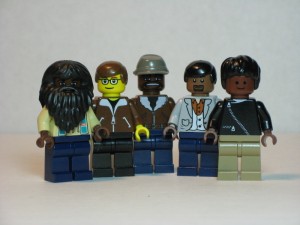 How cool are Brooklyn’s soulful, cerebral art-alt-funk combo TV On the Radio? Never mind their years of critical accolades. Never mind that second vocalist and guitarist Kyp Malone reached the prestigious final round of Stuck Between Stations’ battle of the beards. The real sign they’ve reached the pinnacle is that the Brickshelf Gallery has put them alongside the likes of Bob Dylan, the Beatles, Sleater-Kinney and Johnny Cash in their hall of LEGO rock star action figures.
How cool are Brooklyn’s soulful, cerebral art-alt-funk combo TV On the Radio? Never mind their years of critical accolades. Never mind that second vocalist and guitarist Kyp Malone reached the prestigious final round of Stuck Between Stations’ battle of the beards. The real sign they’ve reached the pinnacle is that the Brickshelf Gallery has put them alongside the likes of Bob Dylan, the Beatles, Sleater-Kinney and Johnny Cash in their hall of LEGO rock star action figures.
TVOTR’s latest album, Nine Types of Light, may come as a bit of a surprise to anyone who still expects the band to be the ragtag upstarts who released OK Calculator a decade ago by hiding it in sofa cushions in New York coffee shops. For the most part, it’s more relaxed than the band’s earlier work, less frenetic than 2006’s Return to Cookie Mountain and less groove-heavy than 2008’s Dear Science.
The shape-shifting opener “Second Song” comes across as a bit of TV On the Radiohead, at least until the charismatic lead vocalist Tunde Adebimpe lets loose with his falsetto. “Killer Crane,” a gorgeous three-lighter ballad with avian imagery and gratuitous banjo, might have a few old-school fans wondering if they’ve accidentally picked up a Decemberists album. The self-explanatory “Caffeinated Consciousness” comes closest to capturing the Pixies-perfect manic energy from earlier albums. A few other songs seem to get their consciousness from herbal tea and a hot bath. These include the soul stirrer “Will Do,” a love song you could imagine Stevie Wonder singing into a telephone sometime in the eighties.
 None of this should suggest that the guys now just sit around watching Oprah and making valentines. TVOTR never were art-punk purists to begin with (nor do they need to be, since that’s why the Lord made Mission of Burma), and they continue to play what the late D. Boon would have called scientist rock. The band’s riveting hour-long “visual reimagining” of Nine Types of Light shows TVOTR fusing lovers’ rock and revolution rock into the same mind-meld. A lot of this could come off as hopelessly pretentious, but the band usually finds the right moment to kick out the jams or segue to a funky new form of future shock. I especially like the video segments that accompany the Parliament-tinged “New Cannonball Blues,” and the Talking Heads-worthy “Repetition,” where survivors of urban anxiety become fish out of water, pushing their way through life during wartime. The songs are bittersweet in light of the sad news that TVOTR’s outstanding bassist Gerard Smith passed away from cancer in April, just after release of the new album.
None of this should suggest that the guys now just sit around watching Oprah and making valentines. TVOTR never were art-punk purists to begin with (nor do they need to be, since that’s why the Lord made Mission of Burma), and they continue to play what the late D. Boon would have called scientist rock. The band’s riveting hour-long “visual reimagining” of Nine Types of Light shows TVOTR fusing lovers’ rock and revolution rock into the same mind-meld. A lot of this could come off as hopelessly pretentious, but the band usually finds the right moment to kick out the jams or segue to a funky new form of future shock. I especially like the video segments that accompany the Parliament-tinged “New Cannonball Blues,” and the Talking Heads-worthy “Repetition,” where survivors of urban anxiety become fish out of water, pushing their way through life during wartime. The songs are bittersweet in light of the sad news that TVOTR’s outstanding bassist Gerard Smith passed away from cancer in April, just after release of the new album.
Someone had better whack me with Peter Gabriel’s sledgehammer before I keep rambling about death-defying high-concept videos and songs with big beats. Adebimpe’s vocals tend to strongly resemble those from PG’s work in the albums following his Genesis exodus. But that’s a very old story, and Adebimpe had the last word on it seven years ago: “At least nobody is comparing anyone in the band to Meat Loaf.” For now, I still love TV On the Radio just the way they are, and have no worries that they will mutate into Mr. Loaf. But if the next album is called Bat Out of Brooklyn, I might start to worry.
TV on the Radio, “New Cannonball Blues”
TV on the Radio, “Repetition”